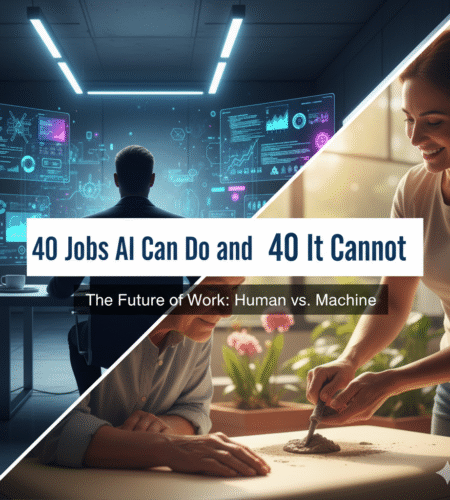Introduction
Artificial Intelligence is transforming the way we work. A new study by Microsoft researchers, based on 2 lakh Copilot conversations, shows how AI jobs overlap with human work. The findings highlight 40 jobs replaced by AI (or at least highly exposed) and 40 safe jobs from AI where machines still struggle.
This insight gives us a glimpse into the future of work — which careers are most at risk and which remain secure, at least for now.
How the Study Was Done
Researchers analysed real workplace use of Copilot to see:
- What people asked AI to do.
- How well AI completed those tasks.
- Which work activities matched specific occupations.
From this, they created an AI applicability score, which shows the level of overlap between AI jobs and human tasks.
40 Jobs Where AI Fits Well
These are the occupations most likely to be jobs replaced by AI in the near term, as they involve writing, research, communication, or structured analysis.
Full list:
- Interpreters & Translators
- Historians
- Passenger Attendants
- Sales Representatives (Services, not retail)
- Writers & Authors
- Customer Service Representatives
- CNC Tool Programmers
- Telephone Operators
- Ticket Agents & Travel Clerks
- Broadcast Announcers & Radio DJs
- Brokerage Clerks
- Farm & Home Management Educators
- Telemarketers
- Concierges
- Political Scientists
- News Analysts, Reporters & Journalists
- Mathematicians
- Technical Writers
- Proofreaders & Copy Markers
- Hosts & Hostesses
- Editors
- Business Teachers (Postsecondary)
- Public Relations Specialists
- Demonstrators & Product Promoters
- Advertising Sales Agents
- New Accounts Clerks
- Statistical Assistants
- Counter & Rental Clerks
- Data Scientists
- Personal Financial Advisors
- Archivists
- Economics Teachers (Postsecondary)
- Web Developers
- Management Analysts
- Geographers
- Models
- Market Research Analysts
- Public Safety Telecommunicators
- Switchboard Operators
- Library Science Teachers (Postsecondary)
Common theme: Knowledge-based AI jobs like writers, editors, data scientists, and web developers face high exposure.
40 Jobs Where AI Struggles
These are the safe jobs from AI for now, as they depend on physical skills, care, or hands-on work.
Full list:
- Phlebotomists (blood sample collection)
- Nursing Assistants
- Hazardous Materials Removal Workers
- Helpers—Painters, Plasterers etc.
- Embalmers
- Plant & System Operators (All Other)
- Oral & Maxillofacial Surgeons
- Automotive Glass Installers & Repairers
- Ship Engineers
- Tire Repairers & Changers
- Prosthodontists
- Helpers—Production Workers
- Highway Maintenance Workers
- Medical Equipment Preparers
- Packaging & Filling Machine Operators
- Machine Feeders & Offbearers
- Dishwashers
- Cement Masons & Concrete Finishers
- Supervisors of Firefighters
- Industrial Truck & Tractor Operators
- Ophthalmic Medical Technicians
- Massage Therapists
- Surgical Assistants
- Tire Builders
- Helpers—Roofers
- Gas Compressor & Pumping Station Operators
- Roofers
- Roustabouts (Oil & Gas)
- Maids & Housekeeping Cleaners
- Paving, Surfacing & Tamping Equipment Operators
- Logging Equipment Operators
- Motorboat Operators
- Orderlies
- Floor Sanders & Finishers
- Pile Driver Operators
- Rail-Track Laying & Maintenance Equipment Operators
- Foundry Mold & Coremakers
- Water Treatment Plant & System Operators
- Bridge & Lock Tenders
- Dredge Operators
Common theme: Occupations needing human touch, physical labour, or empathy are safer in the future of work.
Key Insights for India
1. Knowledge Work is More Exposed
Many Indian “white-collar” roles — writers, coders, analysts — may soon overlap with AI jobs.
2. Physical & Service Work is Safer
Roles like housekeeping, nursing, or construction remain safe jobs from AI, at least until robotics matures.
3. Assistance, Not Full Replacement
While there are headlines about jobs replaced by AI, the reality is most work today is still AI-assisted. Humans add creativity, empathy, and leadership.
4. Top Performers Will Thrive
If you’re in the top 1–5% of your field, combining technical and human skills, you’ll remain valuable in the future of work.
5. Entrepreneurship Will Rise
Many will shift from employees to managers of AI jobs + human work, creating new opportunities in India.
Conclusion
The Microsoft study is not predicting overnight job loss — it shows where AI already performs well and where it doesn’t. For India, the lesson is simple:
- If your work is mostly knowledge-based, you must skill up and focus on outcomes, not just tasks.
- If your work is physical, service-oriented, or empathy-driven, you hold one of the safe jobs from AI — at least for now.
The future of work is about using AI as a partner. Those who adapt and innovate will do better than those who resist change.


Comments